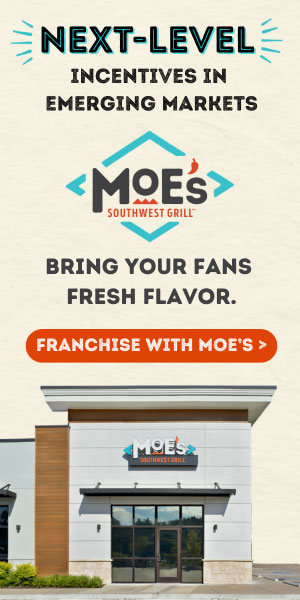Built to Scale: What Multi-Unit Operators Should Demand from Their Franchise Partners

Scaling without a solid foundation is a surefire way to crash. The most successful operators don’t just scale fast; they scale with intention, precision, and a clear path to sustained success. As operators, we’re not looking for temporary traction; we’re building sustainable businesses that need to grow in lockstep with capable partners.
In my journey with Marco’s Pizza, operating 12 locations with two more on the way, I’ve learned that achievement isn’t just about finding a brand with a compelling product. It’s about aligning with a franchise system that’s engineered for expansion. When evaluating their next multi-unit opportunity, here’s what franchisees should demand from their franchise partner.
Beyond the FDD: Demand a scalable model, not just a binder
The Franchise Disclosure Document (FDD) might be the starting point, but it’s not the finish line. A franchise system’s real value lies in how well its model performs in-market. Successful franchisees often align with brands that demonstrate strong unit-level economics and offer a product or service designed not just to sell, but to scale efficiently across diverse markets.
The model is more than words on paper; it’s a blueprint that’ll help you grow across multiple locations. Experienced operators evaluate more than just financials – they observe how the product performs in real-world settings, assess the strength of operational systems, and consider the overall momentum and trajectory of the concept. That’s the difference between a franchise built to sell and one built to scale.
Demand flexibility, not control
Franchising should empower, not constrain. Multi-unit operators bring valuable local insights and operational experience. The best franchise partners recognize that. They provide structure without micromanaging, and they trust operators to lead within the framework.
The key is to find brands that combine reliable operational frameworks with the flexibility for experienced franchisees to make strategic, market-specific decisions. Growth comes when entrepreneurial energy is supported, not stifled.
Insist on a franchise system that shows up
Support shouldn’t fade after the ink dries. Multi-unit expansion requires consistent, high-level backing from onboarding and training to field operations and marketing. When opening multiple locations, gaps in support can’t be patched with good intentions.
What sets brands apart is a commitment to investing in infrastructure and people. Franchise systems that invest in ongoing support infrastructure, such as independent franchisee associations, ongoing grand opening support, or legacy support, signal a genuine commitment to long-term operators, especially during times of expansion, transition, or challenge. A true franchise partner grows with its franchisees.
Expect real financing support, not just standard deals
Access to capital is one of the biggest levers for growth in multi-unit franchising and one of the most overlooked differentiators between average and exceptional franchise systems. While many brands provide templated development agreements or references to standard SBA loans, high-performing systems go further.
Multi-unit operators should look for franchise partners that actively facilitate financing by cultivating relationships with preferred lenders, offering structured development incentives, and understanding the nuances of multi-unit cash flow. This financial support shouldn’t be limited to the signing phase. It should evolve as the operator scales, from initial unit development to reinvestments in remodels, technology upgrades, or market expansion.
Strong franchise systems understand that growth is a shared investment, and they design funding pathways that reduce friction. Real partnership shows up in how the brand helps operators finance the future, not just open the next store.
Prioritize growth potential over name recognition
In franchising, it’s easy to be drawn to household names, assuming brand recognition will naturally translate to profitability. But experienced operators know that logos don’t drive revenue - smart market strategy does. Savvy operators prioritize market potential over brand familiarity, concentrating on areas with opportunities for true growth. This often involves identifying whitespace in geographic regions or customer segments that have a strong demand and limited competition.
Franchisees who take a data-driven, long-term view seek out concepts with flexible models that can succeed in untapped or underserved markets. These operators aren’t chasing buzz; they’re building sustainable businesses where there's room to lead, not just compete.
A strong franchise model should offer more than brand equity; it should provide a clear path to scalable growth, operational support to penetrate new territories, and the agility to adapt to evolving market dynamics. In the end, it’s not about who’s most recognizable. It’s about who’s best positioned to meet demand where others aren’t looking.
The roadmap to multi-unit scalability
Multi-unit franchising is a long game, and the partner you choose matters. The right brand brings more than a product. It brings a scalable model, a flexible mindset, consistent support, strategic financing, and growth potential that isn’t capped by market saturation.
My experience with Marco’s Pizza has shown that when a franchise system is built to scale, operators can build more than units; they can build legacy businesses. Franchisees positioned for growth tend to succeed when aligned with partners equally committed to expansion and long-term scalability.
Ricky Sarkaria is a multi-unit franchisee with Marco’s Pizza.
Share this Feature
Recommended Reading:
| ADVERTISE | SPONSORED CONTENT |
FRANCHISE TOPICS
- Multi-Unit Franchising
- Get Started in Franchising
- Franchise Growth
- Franchise Operations
- Open New Units
- Franchise Leadership
- Franchise Marketing
- Technology
- Franchise Law
- Franchise Awards
- Franchise Rankings
- Franchise Trends
- Franchise Development
- Featured Franchise Stories
| ADVERTISE | SPONSORED CONTENT |

$1,000,000
$65,000





 The multi-unit franchise opportunities listed above are not related to or endorsed by Multi-Unit Franchisee or Franchise Update Media Group. We are not engaged in, supporting, or endorsing any specific franchise, business opportunity, company or individual. No statement in this site is to be construed as a recommendation. We encourage prospective franchise buyers to perform extensive due diligence when considering a franchise opportunity.
The multi-unit franchise opportunities listed above are not related to or endorsed by Multi-Unit Franchisee or Franchise Update Media Group. We are not engaged in, supporting, or endorsing any specific franchise, business opportunity, company or individual. No statement in this site is to be construed as a recommendation. We encourage prospective franchise buyers to perform extensive due diligence when considering a franchise opportunity.